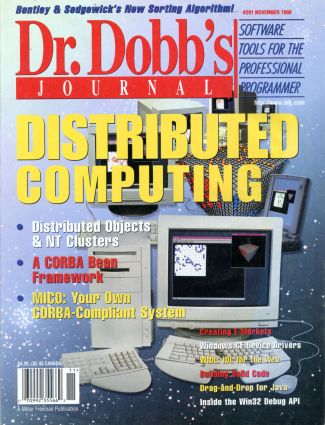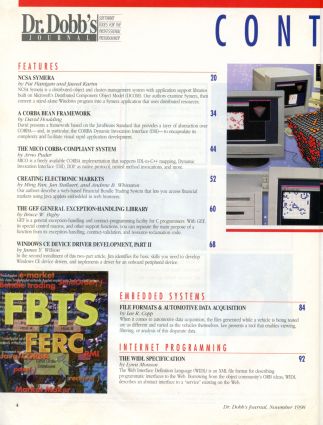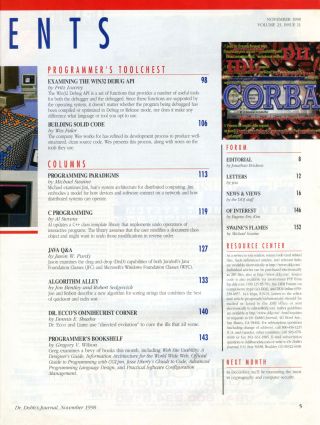
p.8 EDITORIAL
[author : Jonathan Erickson] #Edito
TABLE OF CONTENTS
FEATURES
p.20 NCSA SYMERA
[author : Pat Flanigan and Jawed Karim]
NCSA Symera is a distributed-object and cluster-management system with application support libraries built on Microsoft's Distributed Component Object Model (DCOM). Our authors examine Symera, then convert a stand-alone Windows program into a Symera application that uses distributed resources.
p.34 A CORBA BEAN FRAMEWORK
[author : David Houlding]
David presents a framework based on the JavaBeans Standard that provides a layer of abstraction over CORBA — and, in particular, the CORBA Dynamic Invocation Interface (DII) — to encapsulate its complexity and facilitate visual rapid application development.
p.44 THE MICO CORBA-COMPLIANT SYSTEM
[author : Arno Puder]
MICO is a freely available CORBA implementation that supports IDL-to-C++ mapping, Dynamic Invocation Interface (DII), IIOP as native protocol, nested method invocations, and more.
p.52 CREATING ELECTRONIC MARKETS
[author : Ming Fan, Jan Stallaert, and Andrew B. Whinston]
Our authors describe a web-based Financial Bundle Trading System that lets you access financial markets using Java applets embedded in web browsers.
p.60 THE GEF GENERAL EXCEPTION-HANDLING LIBRARY
[author : Bruce W. Bigby]
GEF is a general exception-handling and contract-programming facility for C programmers. With GEF, its special control macros, and other support functions, you can separate the main purpose of a function from its exception-handling, contract-validation, and resource-reclamation code.
p.68 WINDOWS CE DEVICE DRIVER DEVELOPMENT, PART II
[author : James Y. Wilson]
In the second installment of this two-part article, Jim identifies the basic skills you need to develop Windows CE device drivers, and implements a driver for an onboard peripheral device.
EMBEDDED SYSTEMS
p.84 FILE FORMATS & AUTOMOTIVE DATA ACQUISITION
[author : Lee R. Copp]
When it comes to automotive data acquisition, the files generated while a vehicle is being tested are as different and varied as the vehicles themselves. Lee presents a tool that enables viewing, filtering, or analysis of this disparate data.
INTERNET PROGRAMMING
p.92 THE WIDL SPECIFICATION
[author : Lynn Monson]
The Web Interface Definition Language (WIDL) is an XML file format for describing programmatic interfaces to the Web. Borrowing from the object community's ORB ideas, WIDL describes an abstract interface to a "service" existing on the Web.
PROGRAMMER'S TOOLCHEST
p.98 EXAMINING THE WIN32 DEBUG API
[author : Fritz Lowrey]
The Win32 Debug API is a set of functions that provides a number of useful tools for both the debugger and the debugged. Since these functions are supported by the operating system, it doesn't matter whether the program being debugged has been compiled or optimized in Debug or Release mode, nor does it make any difference what language or tool you opt to use.
p.106 BUILDING SOLID CODE
[author : Wes Faler]
The company Wes works for has refined its development process to produce well-structured, clean source code. Wes presents this process, along with notes on the tools they use.
COLUMNS
p.113 PROGRAMMING PARADIGMS
[author : Michael Swaine]
Michael examines Jini, Sun's system architecture for distributed computing. Jini embodies a model for how devices and software connect on a network and how distributed systems can operate.
p.119 C PROGRAMMING
[author : Al Stevens]
Al updates a C++ class template library that implements undo operations of interactive programs. The library assumes that the user modifies a document class object and might want to undo those modifications in reverse order.
p.127 JAVA Q&A
[author : Jason W. Purdy]
Jason examines the drag-and-drop (DnD) capabilities of both JavaSoft's Java Foundation Classes (JFC) and Microsoft's Windows Foundation Classes (WFC).
p.133 ALGORITHM ALLEY
[author : Jon Bentley and Robert Sedgewick]
Jon and Robert describe a new algorithm for sorting strings that combines the best of quicksort and radix sort.
p.140 DR. ECCO'S OMNIHEURIST CORNER
[author : Dennis E. Shasha]
Dr. Ecco and Liane use "directed evolution" to cure the ills that ail some.
p.143 PROGRAMMER'S BOOKSHELF
[author : Gregory V. Wilson]
Greg examines a bevy of books this month, including Web Site Usability: A Designer's Guide, Information Architecture for the World Wide Web, Official Guide to Programming with CGI.pm, Jesse Liberty's Clouds to Code, Advanced Programming Language Design, and Practical Software Configuration Management.
FORUM
p.12 LETTERS
[author : you]
p.16 NEWS & VIEWS
[author : the DDJ staff]
p.146 OF INTEREST
[author : Eugene Eric Kim]
p.152 SWAINE'S FLAMES
[author : Michael Swaine]

